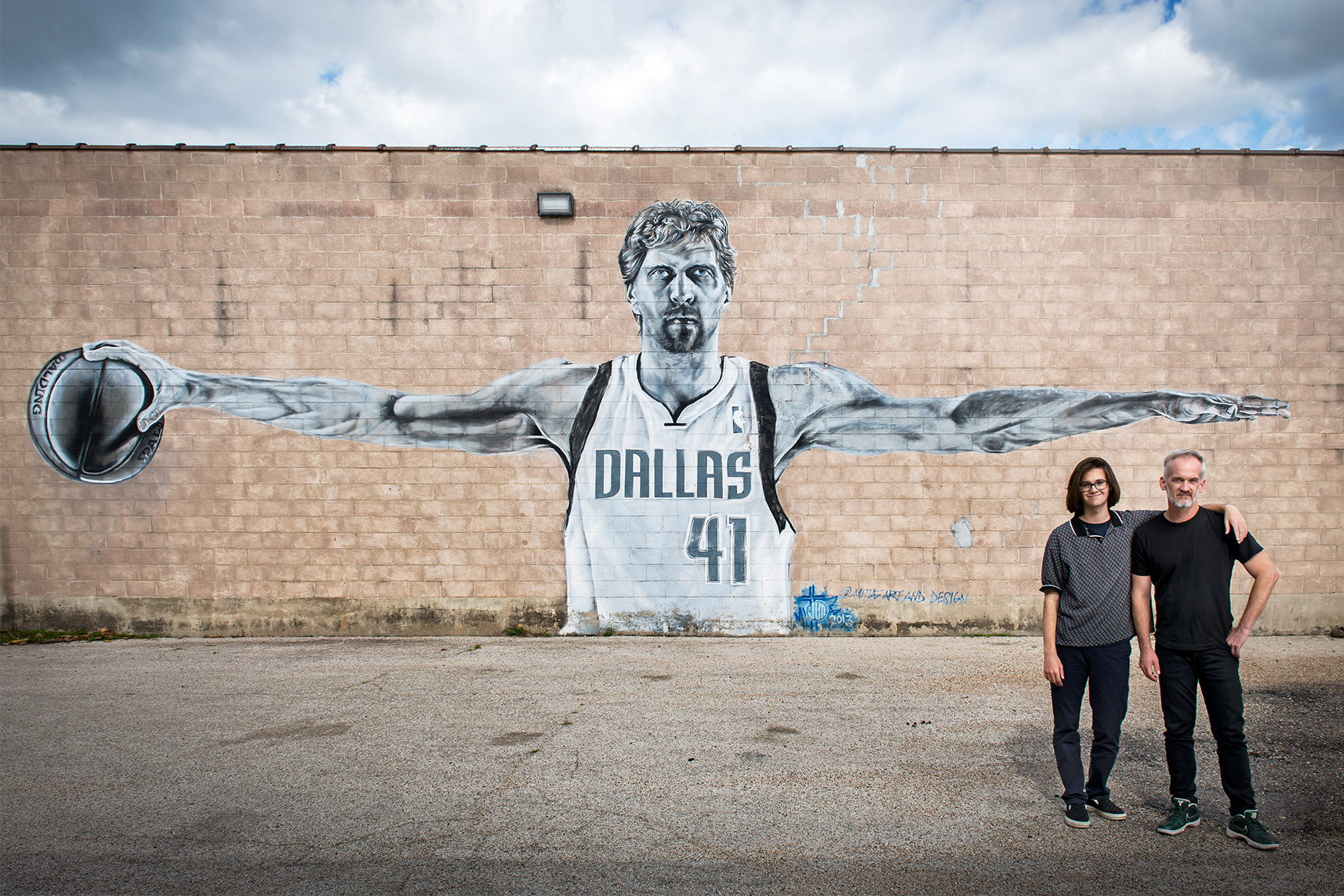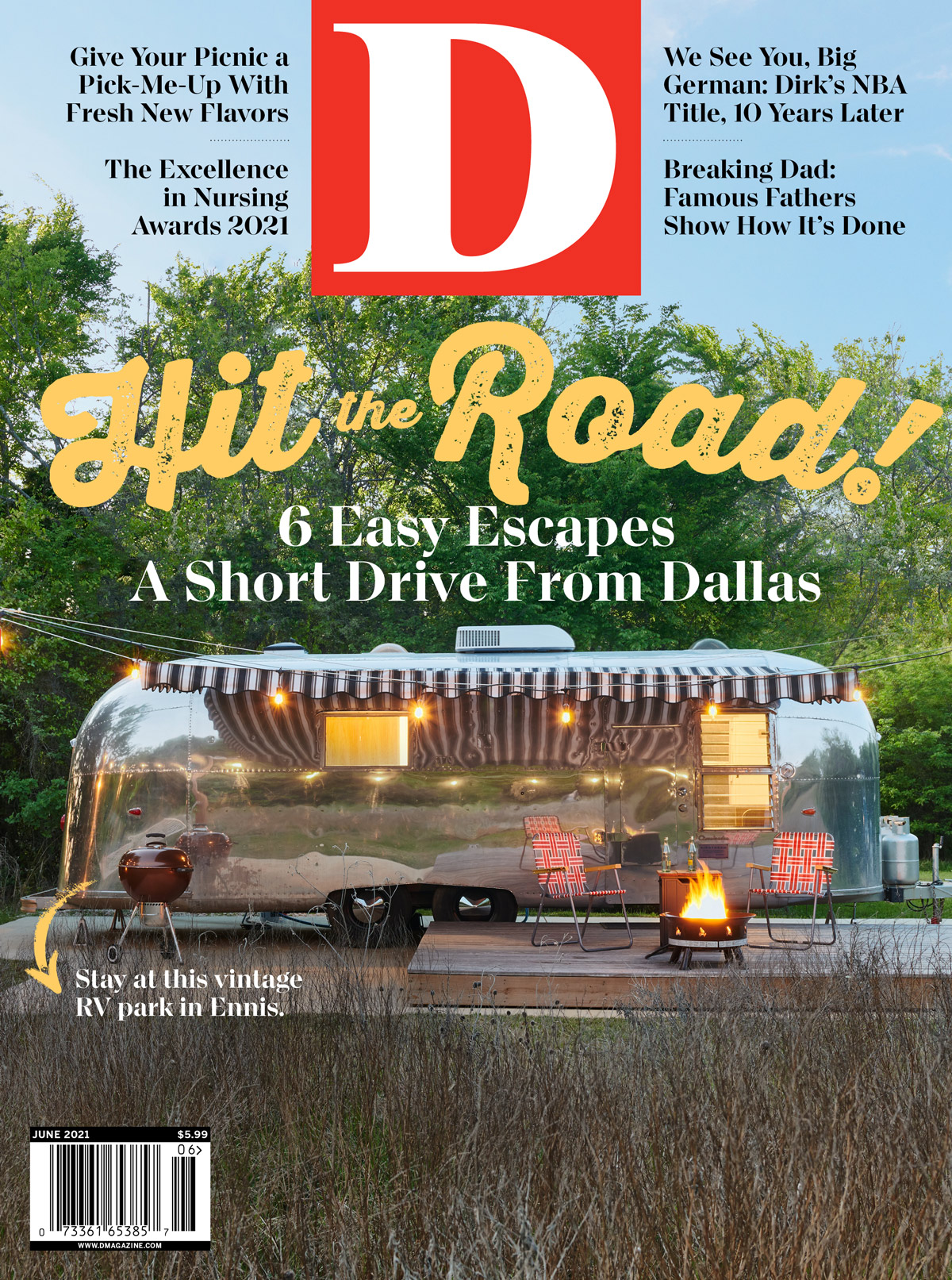Dirk, A group of us watched Game 6 of the 2011 Finals at Joe’s house in Oak Cliff, southwest of downtown. It was a bit strange, because we hadn’t watched any of the other games there and, in fact, I had never even been there. But it was appropriate, too, because my 7-year-old son, Isaac, had always liked Joe—he yelled a lot when he got excited—and Joe, of course, had been a big part of 2006. He was our good luck charm in the deciding game against the Spurs, power-smoking on Eric’s porch. It was the right spot to see you and the Mavs (finally win).
No one wanted to say those words out loud or even see them next to each other, not until it was done. That fucking parade route from 2006 hung over everything. So much had felt cursed since then: 2006 and 2007, obviously, but every other season had some sort of only-in-Dallas type of self-inflicted kick in the jeans. In 2010, the Mavs had gone into the playoffs as the No. 2 seed in the Western Conference—and lost in six games against the Spurs, despite you shooting like you were in an empty gym. That loss didn’t hurt as much; we were becoming numb. And it really seemed like you were destined to join Charles Barkley and Karl Malone on the list of the best players never to win a ring. You turned 32 a couple of months after the season ended. Time was running out.
Even earlier in this unexpected run, in fact, there had been a hint of that self-sabotage, when Portland’s Brandon Roy led a big comeback in the third game of the opening round, a twentysomething-point second-half lead becoming another disastrous loss followed by every talking head and national beat writer and blogger harmonizing on the playoff-classic slow jam, “Same Old Mavs.”
Beating Kobe Bryant and the Lakers—sweeping Kobe Bryant and the Lakers—helped, and so did taking down Oklahoma City in the Western Conference finals, still with its Kevin Durant-Russell Westbrook-James Harden triumvirate, even if that group of three future MVPs, only in its second season together, had a slight whiff of just happy to be there. But it wasn’t until the Miami series that it felt different. Only then did it feel like we were out of reach of the ghosts. Your layup that finished off a giant run that salvaged Game 2 was through-the-looking-glass business, shot like an art film, a speck of blue on a white-sand beach.
Still, it was hard to say out loud, “The Mavs are going to win,” even alone, as if it might summon the bogeyman. No one wanted that anguish again, to invite it over the threshold willingly, to set themselves up for it. Guards were up all over town. And they were definitely still up at Joe’s house, even though it was more or less set up as a victory party. We had been let down so many times, maybe we didn’t believe in the Mavs anymore. But we hadn’t stopped believing in you yet. Couldn’t.
The 2010–11 season was an important one for me and my son, Isaac, and still would be the most important one, regardless of how it ended. His mom and I split up in March 2010, after a few months of headed that way quickly, after a couple of years of headed that way slowly, and officially divorced in June 2010—just when the NBA offseason was beginning, not that I could have been bothered to notice.
Isaac and I had found a new place, but we lived there without any furniture except for our beds for a few months, since what I had was being used to stage the house that I was still paying a mortgage on, which was lingering on the market rather uncomfortably. I had at least gotten $100 knocked off the rent by using my status as a newly divorced father—I didn’t have to tell Isaac to look especially forlorn or fake anything, just quietly nod my head in his direction while negotiating. But it wasn’t easy. We spent most of our time together, in the beginning, anyway, playing Lego Star Wars on the old desktop computer in his room, sharing the keyboard, me hunched over on a little plastic chair from IKEA made for toddlers.
Eventually, we transitioned to basketball in the driveway. He had always been interested, and I’d encouraged that by modifying his Little Tikes hoop into something slightly more realistic by inserting a broom handle between the backboard and the base and taping it all together. And I was a coach on his YMCA team, the Blue Star Wars. But now he was interested. We went to visit my parents in Waco, and while there I had fallen ill, nothing serious, just enough where I had to lie on the couch and watch the HBO documentary about Magic Johnson and Larry Bird. Isaac lay next to me and asked questions; by the end, he was in—on basketball and the way those two played it.
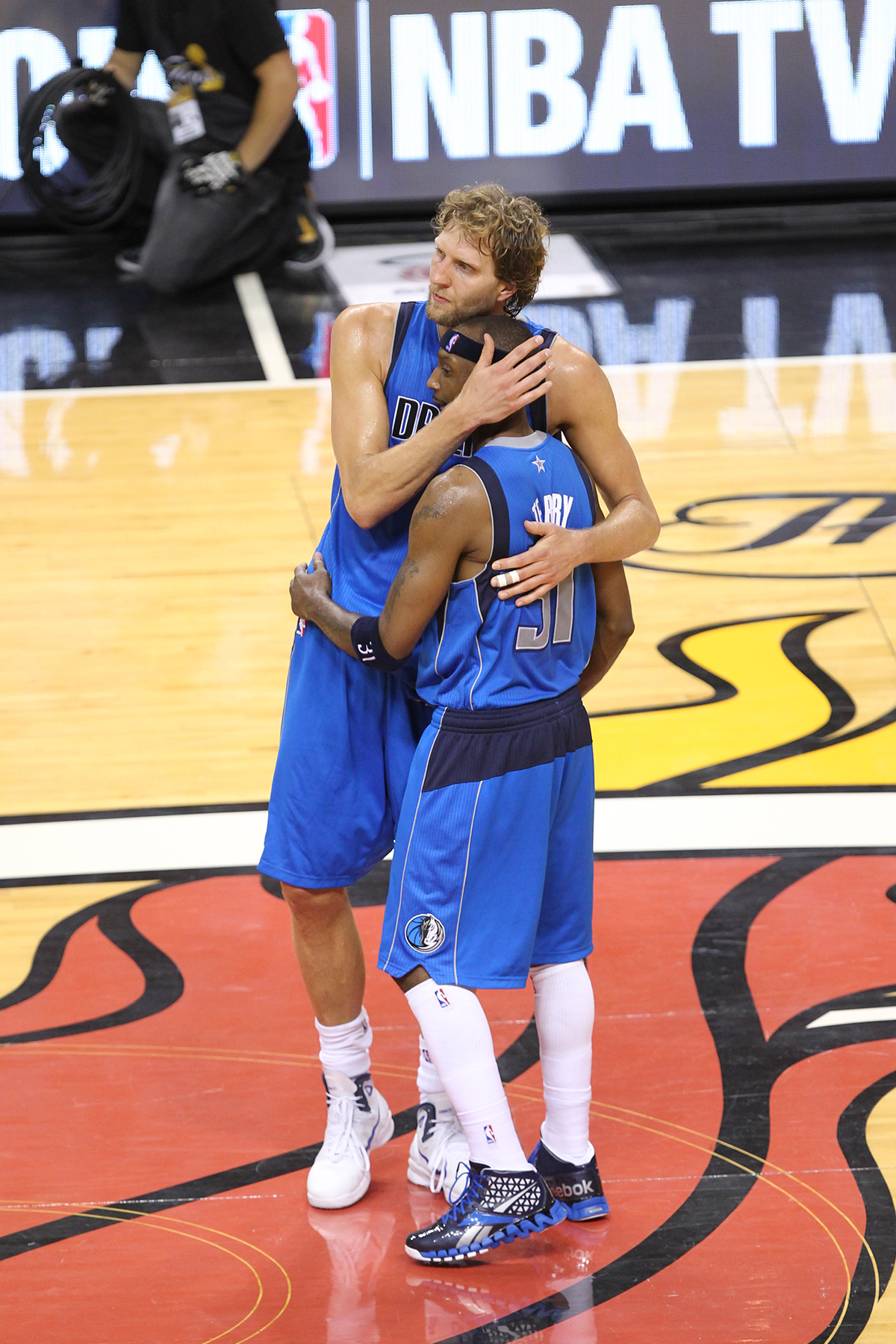
We had gone to a couple of games together and watched a few more, and he could stay invested for a half, maybe three quarters, very, very occasionally all the way through. (Josh Howard was his favorite player, so far as he had one, sorry.) But when the 2010–11 season began, he was intensely focused, vigilant. He had questions and comments, opinions. If there wasn’t a game on, we were in the driveway playing one of our own, usually HORSE to compensate for the height and age difference.
It was our first season on our own, and his first season really watching basketball—getting basketball—and all of it saved us a little. He loved me, he loves me, but until then Isaac had turned to his mother for everything important and just about everything else, too. We didn’t have that bond they had already developed, a hidden language, secret to them.
But now we were getting there, shot by shot, game by game.
Unlike 2006, I actually went to the trouble of getting a media credential for the Finals. I had to go down to the AAC a day or two before and get my photo taken in a trailer the NBA had set up in a parking lot. The pass got me in the building, but it didn’t get me a seat. I hadn’t thought about where I would watch the game and didn’t realize until I arrived that the only place for me was in the media workroom. I also realized that I wasn’t there to cover the Finals. How could I? I was really going to sit there and be professional and not live and die with every possession? With every shot you took? I wasn’t going to clap and scream and boo and talk shit and curse? I wasn’t going to yell, I see you, Big German, until my voice sounded like a pile of asphalt had been granted sentience?
I showed up, walked out of the tunnel and onto the court before Game 3, and looked around, really taking in the whole scene—the blue shirts draped over chairs, the Finals logo on the court—and immediately left. I went to a bar called the Windmill Lounge, a dive a few miles away, getting there a little bit after tipoff. It was better to watch the game as a fan, to watch all of them as a fan, at a bar or at home, or someone’s house, rather than trying to be in the building but having to try to be impartial.
Even if they lost—and I suppose especially if they lost—I would have rather experienced that as a fan and not have to worry about keeping my composure.
“We’re going to approach the next one like it’s our last,” you’d said between Games 2 and 3. “You cannot get a split and a huge emotional win in Game 2 and then go home and lose Game 3.”
You lost Game 3, 88–86.
Chris Bosh, graduate of Dallas’ Lincoln High School, hit the game winner from 16 feet with 39.6 seconds left, after you had tied the score at 86 with a personal 10–0 run. You had a chance to tie it again at the buzzer, but you couldn’t get the shot to fall.
Here’s what I remember on the screen at Joe’s house: with 18.8 seconds left and Kidd shooting free throws, you and Terry hugged at midcourt, then you walked to the other foul line and let out a long breath.
“The look was as good as you get,” you said. You’d done everything you could. You had 34 points, 15 in the fourth alone, going 11–21 with what the Wall Street Journal called, in a headline, “a shot so ugly you can’t stop it.”
But maybe that wouldn’t be enough.
Maybe you would continue to mirror 2006, taking a slightly different path to the same result.
Maybe the Heat were just too good, better than they had been back then, now with LeBron James and Bosh joining Dwyane Wade.
Maybe it just wasn’t meant to be. Not everyone gets to win a championship.
Maybe maybe m a y b e.
Or maybe not.
Game 4 was your version of Michael Jordan’s Flu Game. The night before, you’d come down with a sinus infection. You showed up to shootaround looking like “a ghost,” as Mavs GM Donnie Nelson put it. I understand; I get one every 18 months. It feels like someone has opened a tiny black hole one inch behind your cheekbones. “Every time he started to talk, he started coughing,” center Tyson Chandler said. “He was wheezing.”
You were sent to the locker room and then home, loaded up with medicine. But everyone could see that you hadn’t improved much when you came back for the game. “Dirk is a playful guy and outgoing and outspoken when it comes to the locker room,” Chandler said. “Seeing him not being playful and not really saying much and kind of sitting in his locker, I knew it was going to be a tough night for him.”
While the team tried to keep your illness a secret, it was obvious something was wrong. Battling a 101-degree fever, you missed 10 of 11 shots at one point, and missed a free throw, breaking your second streak of 39 straight in that playoff run. But you stuck it out. You stayed in your chair as long as possible during timeouts, getting every second of rest that you could, only going back on the court when you absolutely had to. You pulled down 11 rebounds and scored 10 of your 21 points in the fourth, as the Mavs outscored the Heat 21–9 over the last 10 minutes of the game to win 86–83. And you refused to see any of it as being out of the ordinary. “After playing eight, nine months on a high level, nobody is completely healthy. It’s time to fight through some stuff.”
Donnie Nelson said it was “our version of Willis Reed,” recalling when the Knicks center limped out to start Game 7 against the Lakers in the 1970 Finals, playing on a torn muscle in his thigh. “I think last night was one of the most inspirational, gut performances in Mavs history,” he said. “If he doesn’t tough it out and if he doesn’t come back, there is no way. I don’t even know how he was standing in that fourth quarter, because that was a physically taxing game. We’re here at 2–2 because of him.”
You went home, took a shower, slurped chicken soup and hot tea, and slept, finally. When you woke up, you were ready to go again, or ready enough. You still didn’t change your routine much. You went to the gym in the afternoon to get some shots up and get a sweat going. You lived for that time. “Basically, for a month and a half, two months, you’re living on the edge every night. You’re thinking about it—eat, breathe, sleep basketball—and that’s what’s fun about the playoffs, but also very draining.”
It would be a race, then, to see if you could win before your body gave up on the 2010–11 season. “We have one more week to go, both teams, and we’re going to go for it. Both teams are going to get their vacation afterward.” By shootaround on Thursday morning, the day of Game 5, you were as close to 100 percent as you could get, or at least putting on a good show for everyone. You needed to. “This is our Game 7 here,” you said, because you couldn’t give Miami two chances to close out the series at home.
You said then and I’m sure you would say now that what happened next didn’t have any effect on you. And maybe it was only us, your fans, your protectors, that took it personally. And maybe that’s how it always was and had been, and why should it be any different then? Maybe you needed to be stoic and let us handle the emotions. Maybe we needed that division of labor, too.
But maybe you cared more than you let on.
“The intensity Dirk had after having his illness questioned by D-Wade and LeBron, I think it’s understated how being in that situation drove him in that moment,” team trainer Casey Smith said when I asked him about it later. “At least in my opinion.”
A day after Game 4, Wade was already waving away any sort of Flu Game talking points: “Everyone is injured at this time,” he said. “I’m not going to get into the fun-loving story of him being sick. Once you show up on the court, you show up on the court. Everyone is equal. He’s a great player without all the dramatics of the stories that’s been going on.”
Wade had a point, probably, and probably it would have been more effective not coming from a player who once had an entire ad campaign for Converse built around the tagline “Fall seven times. Stand up eight,” with video going all the way back to his high school days of him determinedly rising after taking a spill on the court. But, whatever, OK. Remember what happened next?
After the Heat’s shootaround before Game 5, while walking back to the locker room with James, Wade coughed and turned to his teammate. “Whoa, did y’all hear me cough? Think I’m getting sick.” James coughed into his shirt and giggled. CBS 11 in Dallas caught it on camera, and Wade later confusingly said that he knew people would make too much of his joke, which is why he did it. I … guess?
As far as motivation goes, you didn’t hear about the video or the jokes or any of it until Friday. By then, the Mavs had won Game 5 behind your 29 points, which included a go-ahead dunk with 2:45 left. James had a triple-double, but the Mavs still closed out the 112–103 victory on a 17–4 run. Fans at the AAC were wearing blue giveaway shirts with THE TIME IS NOW on the front. It was feeling that way.
When you were told about the video, you said Wade and James were “a little childish, a little ignorant.”
“I’ve been in the league 13 years. I’ve never faked an injury before,” you said. But you tried to quash it. “It’s not going to add anything extra to me. This is the NBA Finals. If you need extra motivation, you have a problem.”
You were right, of course, but it was frustrating. You weren’t even allowed to be tough when you were being tough. I couldn’t help but be angry on your behalf.
But it made sense. After coming to your defense all these years, we needed our moment in the Finals, too.
You were one win away.
“No matter where you see Dirk in the whole scheme of things, he’s put this team on his back,” Donnie said before Game 6 in Miami, “the first time the true alpha dog has been European.”
And then, after 73 games in the regular season and 20 more in the playoffs, suddenly you weren’t. You’d pushed the stone uphill for four years, and now that the top of the mountain was in sight, it started to slip. You missed 11 of your first 12 shots—a wide-open three in the corner, pull-ups, one-legged fadeaways that would normally get rung up on the scoreboard before they even reached the rim.
I don’t know what it’s like to play in an NBA game, much less the deciding game of a championship series, and I can barely recollect my days as a competitive basketball player. But I know what it’s like to want something so much that you start fucking up when it’s close, right there, practically yours but agonizingly not quite yet. How the more you want and try and push, the worse it gets, a fire that your desperation is only fueling, like you’re sweating gasoline. I do know that. I’ve been one for 12 in life plenty of times. If I’m being honest, I am right now. I know what you were feeling.
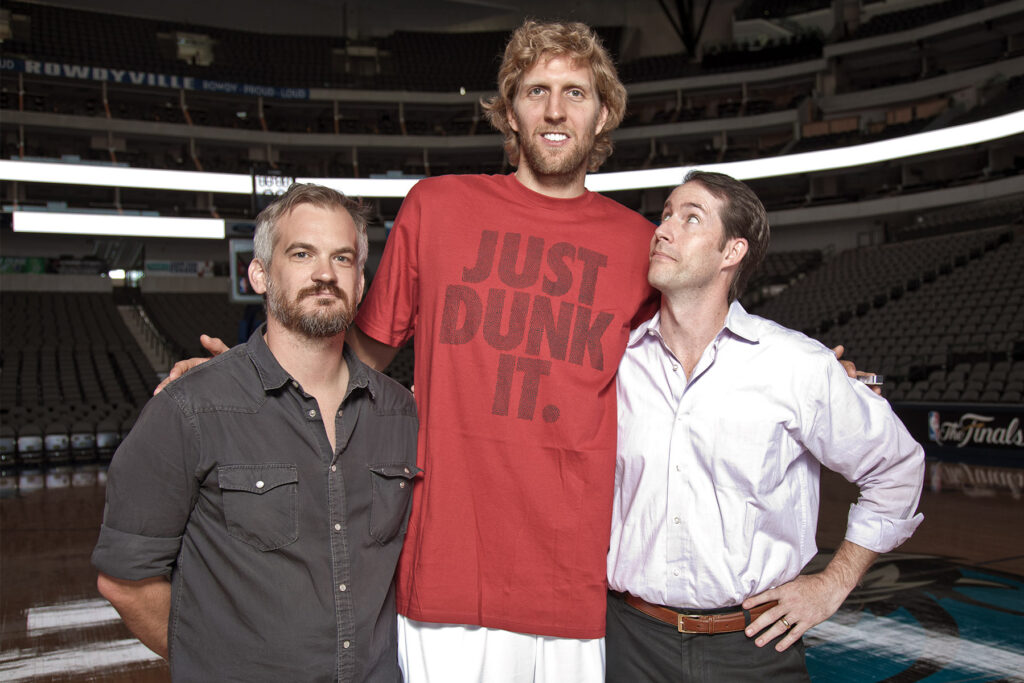
Brian Cardinal knew what you needed. “At halftime, we’re all trying to figure it out,” Cardinal told me. “He’s trying to figure out how to play a little better. We’re all trying to figure out how we can win this game and win the championship. I still remember going in the locker room and trying to pump everybody up and give them fives and talking to them, saying, ‘This is right where we want them.’ And I still remember going up to Dirk and saying in front of folks, ‘Hey, I love it. I love it. You’ve got them right where you want them. You got all your misses out of the way. There’s no way you’re going to shoot that bad in the second half.’ Just trying to gas up the situation. He looks at me, he’s like, ‘Dude, you’re nuts.’ And he came out and played better. Honestly, I have no idea if what I said helped impact anything, but my goal was just to have him relax. Have him calm down a bit. Have him take a breath. So, hopefully, for one split second, he’s thinking about me being a knucklehead and not worrying about the game.”
You made your first shot of the second half, 12 seconds in, a 17-footer on an assist from Jason Kidd. The Heat took the lead a couple of minutes later, held it for 16 seconds, and never got closer than seven in the fourth quarter. You shot eight of 15 in the second half, finishing with 21 points and 11 rebounds in a 105–95 win. You didn’t back into a championship. You didn’t make your teammates carry you over the line. You grabbed control of the game in the third and fourth quarters. Like Chandler said, they just had to get you there. For the series, you had 62 fourth-quarter points; James had 18. You shot 18–35 from the field in the final periods—including 5–8 in Game 6, with Jason Terry telling you, “Remember ’06,” throughout—and a perfect 24–24 from the foul line.
Almost everyone had a moment in Game 6. Terry had 27 points (on brilliant 11–16 shooting). Shawn Marion had 12 points and eight rebounds and his usual great defense. Kidd had eight assists. J.J. Barea had 15 points and DeShawn Stevenson had three big first-half threes. Reserve center Ian Mahinmi hit a rare jumper to beat the third-quarter buzzer (and a surprisingly deft one-legged fadeaway earlier). And Cardinal, in addition to his halftime antics, nailed a three and drew an offensive foul on Wade.
Here’s what I remember on the screen at Joe’s house: with 18.8 seconds left and Kidd shooting free throws, you and Terry hugged at midcourt, then you walked to the other foul line and let out a long breath. Hell yes. You would turn 33 in exactly one week. I would turn 37 the next day.
Mario Chalmers hit a three with 16 seconds left to end the scoring, and while the Mavs dribbled out the clock, you left the court. You hopped over the scorer’s table and went to the locker room, overcome by the moment and unwilling to share it or exploit it. You lay down on the floor and cried. I’ve always wondered what those few minutes in the locker room were like. I’ve had the chance to ask you, but the truth is, I don’t want to know the specifics, not beyond what I already know. That moment belongs to you. You have already given me, given us, given Dallas enough. You never stopped believing in us.
Before the 2010–11 season, when you were a free agent, I began to steel myself for the idea of seeing you in another uniform or, worse, not seeing you on the court at all. It seemed like it was getting to be almost that time. You had been in the league for a dozen years by then, and sports franchises in Dallas weren’t any more loyal than those in other cities. Emmitt Smith took his final handoffs in Arizona. Tony Romo was nudged toward the broadcast booth when he probably had a few more passes left in him. The last time Mike Modano took the ice, it was in a Detroit Red Wings sweater. None of the great Dallas Mavericks who came before you finished their careers with the team. We had to watch Michael Finley win a title with the Spurs, in 2007.
You could have left, and no one could have held it against you if you had, if you had taken your talents to Phoenix to rejoin Steve Nash for one more run, or to L.A. to pair with Kobe Bryant, coming off back-to-back titles, or somewhere else. (As long as it wasn’t Golden State or Miami—it was still too soon. OK, or San Antonio, either.) But you stayed in Dallas, and, more than that, you became a real Dallasite, enmeshing yourself in the city and its culture. It would have, obviously, been incredible to win a championship in 2006 or 2007. But this was somehow better, because you didn’t give up on us. The least we can give you, the least I can give you, is that moment by yourself in the locker room.
Eventually, your buddy Scott Tomlin, a PR guy for the team, coaxed you back out to the floor to celebrate with your teammates. Don Carter, the cowboy who started the franchise, got the Larry O’Brien Trophy first. Then Cuban. Then you. Then Celtics legend Bill Russell presented you with the Finals MVP trophy.
“Nowitzki is one of the greatest players in the history of the game, and that has been validated here tonight,” coach Rick Carlisle said. Erik Spoelstra called you “indefensible.” “His game has continued to elevate in his 30s,” the Heat coach said. “That’s a remarkable thing.”
Back in Würzburg, Germany, where hundreds gathered to watch, your dad said, “It really is something special for Dirk because he’s finally recognized in America, too, as a real sporting great.”
It was one of the best playoff runs ever: you beat Kobe Bryant and Pau Gasol; Kevin Durant, Russell Westbrook, and James Harden; Brandon Roy and LaMarcus Aldridge; and LeBron James, Dwyane Wade, and Chris Bosh, all in the same postseason. You had six games scoring 30-plus points, finishing with averages of 27.7 points, 8.1 rebounds, 2.5 assists, and shooting percentages of 49 percent from the field, 46 percent from three, and 94 percent from the free-throw line. No one had ever done that before, and no one has done it since. You didn’t have an easy road. It didn’t align perfectly. You went through the defending champions and their presumptive successors. And it wasn’t a fluke or an accident.
Where did you rank after? Does it matter? Someone said after Game 6 that you “carried [your] team like no other MVP since Jordan” and it sounds wild, but it is also undeniable.
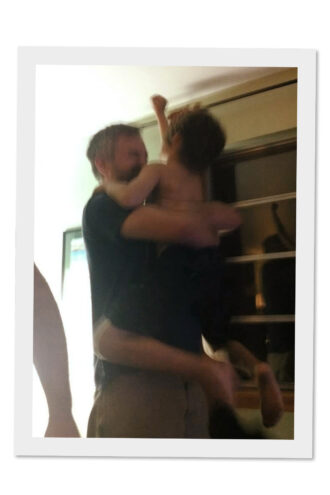
“I still can’t believe it,” you said. “This team has ridden a lot of ups and downs, always stayed together.
“Still can’t believe it.”
I have a photo on my phone, and it’s been on three or four phones now, and it’ll be on three or four more. Whenever I run across it while looking for something else, I post it on Instagram or Facebook or text it to Isaac, or all three. Just before I wrote these sentences, I sent it to Isaac 3 feet away on the couch across from me. Mostly, I just look at it and remember. It’s not technically a good photo, no offense to my friend Jessica, who took it without my knowing and sent it to me a few days later. It’s blurry, a bit blown out, a stray arm is jutting into the frame. But none of that matters. It’s perfect as is.
Jessica took it a few seconds after Game 6 ended. Isaac had started taking off his shirt when he got excited, like changing into a superhero costume in reverse. He had to release his energy into the universe, and, to do so, he had to be topless. During this game, after he’d removed his shirt, he became so overcome that he bounced into the stand holding Joe’s TV and almost brought the 70-inch screen on top of him. He calmed down after that, a little bit. But the shirt stayed off, and so in the photo, Isaac is tiny and shirtless and jumping into my arms, his left arm wrapping around my neck, his right fist almost punching the ceiling. My eyes are closed tight, and my arms are around him even tighter, and I look like I’m about to crush his little torso, and I can’t believe he was ever so small or we were both so happy. It’s pure joy, for the Mavs and for each other.
We left not long after and drove home the long way, through Oak Cliff and through downtown, the streets choked with cars honking at each other and at nothing, not one of them unhappily.
I have another photo taken in the wake of the championship that I see even more often than the one of me and Isaac that is on my phone, because this one is on my refrigerator.
At some point during the Finals, my editor at D Magazine, Tim Rogers, had brought up the idea of putting you on the cover if the Mavs won the title, and just the suggestion, not spoken but sent in a text, made me feel like we were outlining a parade route, tempting the basketball gods to kick the ladder out from under us again.
But even though it was almost enough to chest-pass a black cat in your path, we didn’t jinx you, and somehow in the aftermath of Game 6 we arranged for our photographer, Marc Montoya, and his producer wife, Kristen, to set up on the court at the AAC a couple of days later when the team made it back to Dallas and met with the assembled media. The Mavs PR folks said they’d bring you to us—Tim and I showed up, because there was no way we were missing this—and we’d get 10 minutes.
After a bit of a delay—there were a lot of people waiting for you—you came strolling out across the court to the Montoyas’ portable backdrop, looking like a college sophomore in slides, white basketball shorts, and a red Nike JUST DUNK IT t-shirt.
Marc was so excited that he didn’t even need the full 10 minutes, getting from the first frame to the last in around seven. After Marc got his shot—and you know what ended up on the cover because it’s still all over town, a close-up of you with your eyes closed dreamily and a beatific smile, the kind of peace you only see faked in Corona commercials and yoga studio Instagram Stories; it’s the smile of someone who has let go of the past and doesn’t have to deal with the future yet, perfectly at ease in the present—after that, you agreed to take a photo with me and Tim.
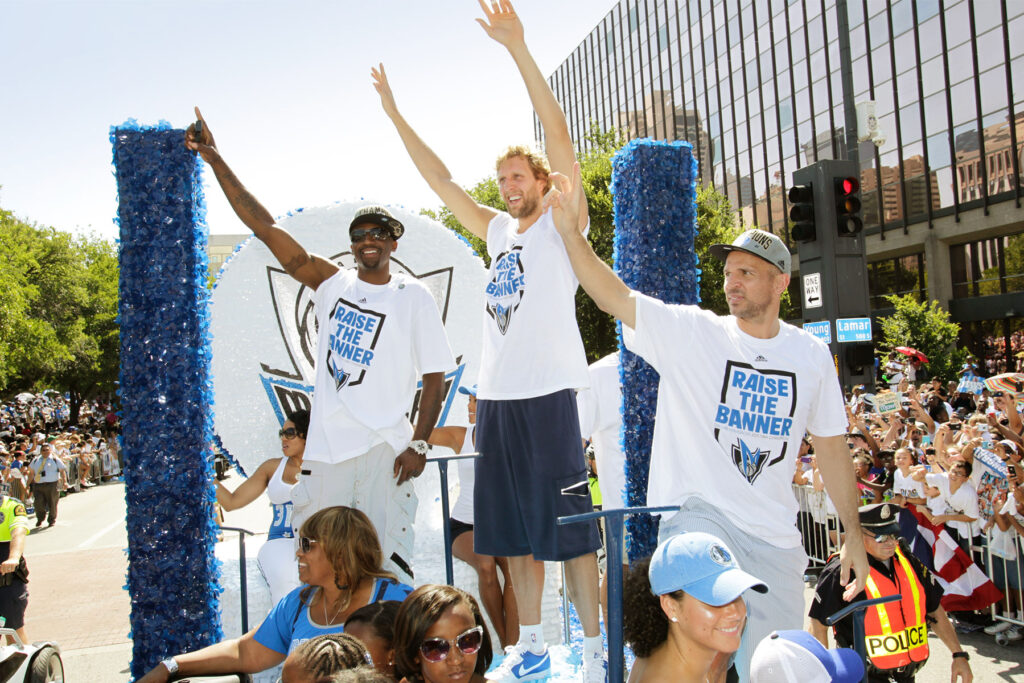
We had photographed you for the magazine once before, a couple of years earlier, for an oral history I had put together for your first decade in Dallas. You agreed to wear a throwback uniform we had specially made for you, even after it showed up half an hour late, and you even rolled up the waistband of the shorts to make them extra short, and you didn’t complain when our photographer almost knocked her light rig over on top of you. And after all of that, we put a photo of Kurobuta pork jowls on the cover instead of you. (In our defense, it was our annual Best Restaurants issue.)
When Tim and I got on either side of you for our photo, you asked if you were going to be on the cover this time—or were we going with the pork jowls again.
I think about that little joke every time I see that photo, so I think about that joke almost every day.
Over 13 seasons, you became Dallas and Dallas became you and I was wrapped up in there somewhere, identifying with one or the other or both. Dallas has an inferiority complex still, but at that time maybe you did, too, and at this time maybe I do, too.
You represented us broadly and specifically, able to stand in for the city and for the people in it, coming close to the top so many times only to chutes-and-ladders back to the bottom. I wanted you to beat Miami for yourself but also for Dallas and also for me. We needed a win. I needed a win.
It’s not even that, or just that. Maybe I’m alone here, maybe I’m generalizing, but sometimes, a lot of times, I don’t even need a win. I just don’t want a loss. I just want to Ctrl-F “Dallas” in the latest dumb news story of the day and get zero hits. I just don’t want us to embarrass ourselves. And I actually don’t think I’m alone, and I don’t think I’m generalizing.
When 2011 happened, it wasn’t that it was unexpected. It was that it was an occurrence that people had stopped applying expectations to by then. The idea of winning a championship was like a dog that had wandered away from our campsite three or four years ago and then miraculously showed up on our doorstep. It was something we hoped would happen but had given up expecting.
At the outset of the playoffs, in April, I had the same goofy hope I’d had since 2003—that we had you, so we had a chance. Maybe this will be the year. You could have stepped in an actual bear trap before a game and I would have argued that your game wasn’t built on speed or athleticism, so you would probably be OK. But I don’t know if I still believed it and I don’t know when I stopped. Maybe the year before, when you guys went into the postseason as the No. 2 seed and lost to the Spurs again and it just seemed like nothing would ever change.
And then you did it. You fucking did it.
Write to [email protected]. This excerpt originally ran in the June issue of D Magazine. Buy the book via Deep Vellum Publishing here.


